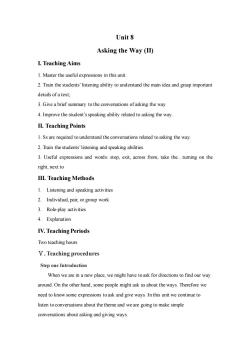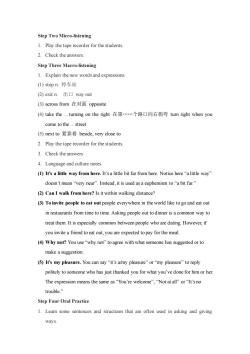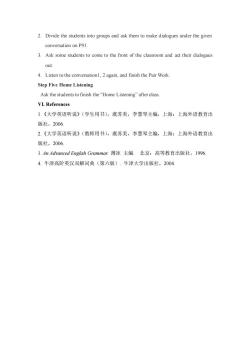《大学英语读写》课程教学资源(听说一级教案)Unit 8 Asking the Way(II)

Unit 8 Asking the Way (II) I.Teaching Aims 1.Master the useful expressions in this unit. 2.Train the students'listening ability to understand the main idea and grasp important details ofa text; 3.Give a brief summary to the conversations of asking the way 4.Improve the student's speaking ability related to asking the way. II.Teaching Points 1.Ss are required to understand the conversations related to asking the way. 2.Train the students'listening and speaking abilities. 3.Useful expressions and words:stop,exit,across from,take the...tuming on the right,next to III.Teaching Methods 1.Listening and speaking activities 2.Individual,pair,or group work 3.Role-play activities 4.Explanation IV.Teaching Periods Two teaching hours V.Teaching procedures Step one Introduction When we are in a new place,we might have to ask for directions to find our way around.On the other hand,some people might ask us about the ways.Therefore we need to know some expressions to ask and give ways.In this unit we continue to listen to conversations about the theme and we are going to make simple conversations about asking and giving ways
Unit 8 Asking the Way (II) I. Teaching Aims 1. Master the useful expressions in this unit. 2. Train the students’ listening ability to understand the main idea and grasp important details of a text; 3. Give a brief summary to the conversations of asking the way 4. Improve the student’s speaking ability related to asking the way. II. Teaching Points 1. Ss are required to understand the conversations related to asking the way. 2. Train the students’ listening and speaking abilities. 3. Useful expressions and words: stop, exit, across from, take the…turning on the right, next to III. Teaching Methods 1. Listening and speaking activities 2. Individual, pair, or group work 3. Role-play activities 4. Explanation IV. Teaching Periods Two teaching hours Ⅴ. Teaching procedures Step one Introduction When we are in a new place, we might have to ask for directions to find our way around. On the other hand, some people might ask us about the ways. Therefore we need to know some expressions to ask and give ways. In this unit we continue to listen to conversations about the theme and we are going to make simple conversations about asking and giving ways

Step Two Micro-listening 1.Play the tape recorder for the students. 2.Check the answers. Step Three Macro-listening 1.Explain the new wordsand expressions (1)stop n.停车站 (2)exit n.出口way out (3)across from在对面opposite (4)take the..turning on the right在第…个路口向右拐弯turn right when you come to the...street (⑤)next to紧靠着beside,.very close to 2.Play the tape recorder for the students. 3.Check the answers 4.Language and culture notes (1)It's a little way from here.It'sa little bit far from here.Notice here"a little way doesn't mean"very near".Instead,it is used as a euphemism to"a bit far." (2)Can I walk from here?Is it within walking distance? (3)Toinvite people toeat out people everywhere in the world like to go and eat out in restaurants from time to time.Asking people out to dinner is a common way to treat them.It is especially common between people who are dating.However,if you invite a friend toeat out,you are expected topay for the meal (4)Why not?You use"why not"to agree with what someone has suggested or to make a suggestion. (5)It's my pleasure.You can say"it's a/my pleasure"or"my pleasure"to reply politely to someone who has just thanked you for what you've done for him or her The expression means the same as"You're welcome","Not at all"or"It's no trouble." Step Four Oral Practice 1.Leamn some sentences and structures that are often used in asking and giving ways
Step Two Micro-listening 1. Play the tape recorder for the students. 2. Check the answers. Step Three Macro-listening 1. Explain the new words and expressions (1) stop n. 停车站 (2) exit n. 出口 way out (3) across from 在对面 opposite (4) take the …turning on the right 在第……个路口向右拐弯 turn right when you come to the …street (5) next to 紧靠着 beside, very close to 2. Play the tape recorder for the students. 3. Check the answers 4. Language and culture notes. (1) It’s a little way from here. It’s a little bit far from here. Notice here “a little way” doesn’t mean “very near”. Instead, it is used as a euphemism to “a bit far.” (2) Can I walk from here? Is it within walking distance? (3) To invite people to eat out people everywhere in the world like to go and eat out in restaurants from time to time. Asking people out to dinner is a common way to treat them. It is especially common between people who are dating. However, if you invite a friend to eat out, you are expected to pay for the meal. (4) Why not? You use “why not” to agree with what someone has suggested or to make a suggestion. (5) It’s my pleasure. You can say “it’s a/my pleasure” or “my pleasure” to reply politely to someone who has just thanked you for what you’ve done for him or her. The expression means the same as “You’re welcome”, “Not at all” or “It’s no trouble.” Step Four Oral Practice 1. Learn some sentences and structures that are often used in asking and giving ways

2.Divide the students into groups and ask them to make dialogues under the given conversation on P91. 3.Ask some students to come to the front of the classroom and act their dialogues out. 4.Listen to the conversationl,2 again,and finish the Pair Work. Step Five Home Listening Ask the studentsto finish the"Home Listening"after class VI.References 1.《大学英语听说》(学生用书),虞苏美,李慧琴主编,上海:上海外语教育出 版社,2006. 2.《大学英语听说》(教师用书),虞苏美,李慧琴主编,上海:上海外语教育出 版社,2006. 3.An Advanced English Grammar.薄冰主编.北京:高等教育出版社,1996. 4.牛津高阶英汉双解词典(第六版),牛津大学出版社,2004
2. Divide the students into groups and ask them to make dialogues under the given conversation on P91. 3. Ask some students to come to the front of the classroom and act their dialogues out. 4. Listen to the conversation1, 2 again, and finish the Pair Work. Step Five Home Listening Ask the students to finish the “Home Listening” after class. VI. References 1.《大学英语听说》(学生用书),虞苏美,李慧琴主编,上海:上海外语教育出 版社,2006. 2.《大学英语听说》(教师用书),虞苏美,李慧琴主编,上海:上海外语教育出 版社,2006. 3. An Advanced English Grammar. 薄冰 主编. 北京:高等教育出版社,1996. 4. 牛津高阶英汉双解词典(第六版). 牛津大学出版社,2004
按次数下载不扣除下载券;
注册用户24小时内重复下载只扣除一次;
顺序:VIP每日次数-->可用次数-->下载券;
- 《大学英语读写》课程教学资源(听说一级教案)Unit 7 Asking the Way(I).doc
- 《大学英语读写》课程教学资源(听说一级教案)Unit 6 Apologies(II).doc
- 《大学英语读写》课程教学资源(听说一级教案)Unit 5 Apologies(I).doc
- 《大学英语读写》课程教学资源(听说一级教案)Unit 4 Unit 4 Study(II).doc
- 《大学英语读写》课程教学资源(听说一级教案)Unit 3 Unit 3 Study(I).doc
- 《大学英语读写》课程教学资源(听说一级教案)Unit 2 Unit 2 Meeting People(II).doc
- 《大学英语读写》课程教学资源(听说一级教案)Unit 15 Description(I).doc
- 《大学英语读写》课程教学资源(听说一级教案)Unit 14 Shopping(II).doc
- 《大学英语读写》课程教学资源(听说一级教案)Unit 13 Shopping(I).doc
- 《大学英语读写》课程教学资源(听说一级教案)Unit 12 Asking the Way(II).doc
- 《大学英语读写》课程教学资源(听说一级教案)Unit 11 Dining Out(I).doc
- 《大学英语读写》课程教学资源(听说一级教案)Unit 10 Daily Activities(II).doc
- 《大学英语读写》课程教学资源(听说一级教案)Unit 1 Meeting People(I).doc
- 山西农业大学:《植保专业外语》课程教学资源(电子教案,授课教师:郝赤).doc
- 天津开放大学:《日语》课程教学资源(辅导资料)课程说明_日语(1).doc
- 天津开放大学:《法语》课程教学资源(学习资料)课程教学大纲_法语(1).doc
- 天津开放大学:《法语》课程教学资源(学习资料)讲法语的42个国家与地区_法语(1).doc
- 天津开放大学:《法语》课程教学资源(学习资料)考核说明_法语(1).doc
- 天津开放大学:《日语》课程教学资源(辅导资料)考核说明_日语(1).doc
- 天津开放大学:《日语》课程教学资源(辅导资料)考核说明_日语(2).doc
- 《大学英语读写》课程教学资源(听说一级教案)Unit 9 Daily Activities(I).doc
- 《大学英语读写》课程教学资源(听说一级教案)Unit 16 Unit 16 Description(II).doc
- 《大学英语读写》课程教学资源(听说二级教案)Topic 1 Telephoning.doc
- 《大学英语读写》课程教学资源(听说二级教案)Unit 3 giving advice(I).doc
- 《大学英语读写》课程教学资源(听说二级教案)Unit 7 & 8.doc
- 《大学英语读写》课程教学资源(听说二级教案)Unit 9 & 10 Seeing the Doctor.doc
- 《大学英语读写》课程教学资源(听说二级教案)Unit 13 Dating(I).doc
- 《大学英语读写》课程教学资源(听说二级教案)Unit 14 Dating(II).doc
- 《大学英语读写》课程教学资源(听说二级教案)Unit 1 & 2 Telephoning.doc
- 《大学英语读写》课程教学资源(听说二级教案)Unit 11 & 12 Teaching Aims.doc
- 《大学英语读写》课程教学资源(听说二级教案)Unit 13 & 14 Dating.doc
- 《大学英语读写》课程教学资源(听说二级教案)Unit 15 & 16 Lifestyle.doc
- 《大学英语读写》课程教学资源(听说二级教案)Unit 3 & 4 Giving Advice.doc
- 《大学英语读写》课程教学资源(听说二级教案)Unit 5 & 6 Talking About theWeather.doc
- 《大学英语读写》课程教学资源(听说三级教案)Unit 10 Law and order.doc
- 《大学英语读写》课程教学资源(听说三级教案)Unit 11 Story Time.doc
- 《大学英语读写》课程教学资源(听说三级教案)Unit 12 Famous People.doc
- 《大学英语读写》课程教学资源(听说三级教案)Unit 13 Music.doc
- 《大学英语读写》课程教学资源(听说三级教案)Unit 14 Education.doc
- 《大学英语读写》课程教学资源(听说三级教案)Unit 15 Accidents and Disasters.doc
